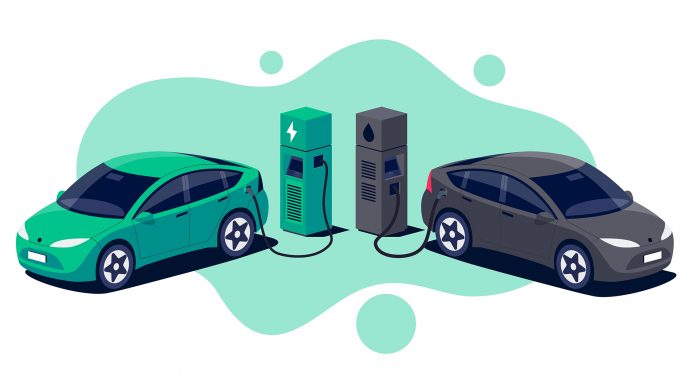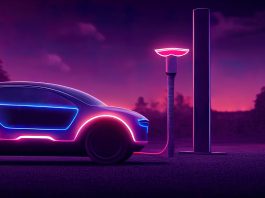With the 2030 ICE ban, legislation to prohibit petrol and diesel vehicle sales in the UK by 2030, the government has made electric vehicles (EVs) crucial to its net-zero strategy. If it fails to pave the way for a seamless EV transition in time, the UK risks undermining its goal to be net zero by 2050.
While good work is happening on this front, much is left to do before 2030, and the clock is ticking.
Nick Woolley, CEO and Co-Founder at ev.energy, the leading provider of smart EV charging software, discusses how industry collaboration will be key to accelerating the UK’s EV transition.
The electrification of transport is crucial to achieve net zero
The electrification of transport has the potential to drive a low-carbon economy with increased energy security and cleaner communities for all. While macro factors, such as the war in Ukraine, lithium and chip shortages and economic instability across the world are undoubtedly having an impact on production, pricing and purchase decisions related to EVs, we’re only headed in one direction long-term.
To reach 2030, the UK cannot afford to baulk in its EV transition. Every day counts. We must move steadily and quickly towards our goal.
Fortunately, great work is already taking place to prepare for the ICE ban – manufacturers are broadening their electric ranges, home chargers are falling in price, and policy on smart charging and EV-related building regulations is now in place.
However, there is still work to be done to deliver EV products and services suitable for mass adoption and ensure the grid is able to support the growing electricity demand.
Industry must collaborate to tackle these challenges and reap the benefits of a low-carbon energy and transport ecosystem for all.
Affordable and compelling solutions are vital for the EV transition
To enable mass adoption of EVs, the industry must provide affordable and compelling solutions that meet consumers’ personal, social, and financial needs.
One of the biggest obstacles keeping many consumers from considering an EV is the high cost of EVs and chargers. Throw in the limited charging infrastructure that exists in the UK and the complications of installing chargers at home and it’s easy to see why some consumers are being put off investing in the EV transition for now.
Part of the solution lies in automotive and energy players collaborating to offer affordable solutions suitable for the mass market. Consider the work that ev.energy does, for example. We keep costs low for drivers while enabling a reliable, low-carbon grid through our EV smart charging software.
In fact, by allowing EV owners to take advantage of cheaper off-peak electricity rates, smart charging can reduce the average costs of operating an EV by up to £657 per year compared to standard charging.
Volkswagen, which ev.energy has worked with, is already seizing the opportunity to create a more attractive and straightforward offering through their Elli brand which offers chargers, smart charging and energy tariffs in Germany.
As the technology powering our vehicles changes, now is the time to review all stages of the driver experience to unlock growth.
Managing EV charging demand
As adoption ramps up, it’s crucial that the industry makes EV charging sustainable for the National Grid, rather than an energy demand headache. Nobody wants a return to the blackouts of yesteryears.
Thankfully, with collaborative action now, grid operators and manufacturers can take advantage of EVs to manage demand, reduce emissions and bring down bills.
This is crucial to prevent overwhelming the grid in the coming years – a real risk which was underlined recently with news surrounding potential power outages in the UK as energy supplies fell short while demand increased over the winter.
The National Grid moved swiftly to launch the Demand Flexibility Scheme (DFS), a government-backed scheme which incentivised consumers and businesses to shift their electricity usage away from peak times to help balance the grid and reduce the risk of power outages.
This type of demand response programme is a critical component of ensuring grid stability as the EV transition happens. To be clear, this presents an opportunity – it is not something to fear. With the help of EV charging software, the UK can balance electricity demand, reduce wholesale electricity prices and integrate more renewable energy into the grid. This will create a clean, affordable and secure energy grid for all.
Collaboration with the government
The UK Government can help to address some of the biggest challenges facing the EV transition – such as providing financial support for cross-collaboration programmes and educating electricians, the frontline gatekeepers of our industry, to enable smart grid solutions.
While it’s positive to see the UK leading in EV regulatory compliance, it’s also necessary to build and deliver actual solutions that meet the demands of consumers. By working with the government to achieve this the EV industry can continue to grow.
Just look at the Inflation Reduction Act in the US – an excellent case study of government-industry collaboration in practice.
Bringing energy and transport together with software
The convergence of energy and transport industries is now more evident than ever, here and around the world. Many carmakers are as much viewed as energy companies as they are automotive organisations – take Tesla, for instance. This shift highlights the critical importance of cross-industry collaboration for the mass adoption of EVs.
This is where EV software comes in – providing a seamless connection between grid operators and vehicles to deliver green, affordable and convenient solutions for EV drivers.
Through joint action, we can achieve a robust and secure energy system for the future while paving the way for a low-carbon economy in which the EV transition will play a big part. The time to take action is now and with effective industry collaboration, the full potential of the EV transition will be unlocked.
For more information about the role of smart charging in driving the EV transition visit https://www.ev.energy/
Nick Woolley
CEO and Co-Founder
ev.energy








